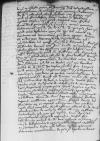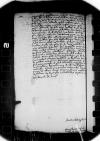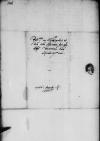Letter #2750
Stanisław HOZJUSZ (HOSIUS) to Ioannes DANTISCUSBrest-Litovsk, 1544-08-18
| received Heilsberg (Lidzbark), 1544-08-24 Manuscript sources:
Prints:
| ||||||
Text & apparatus & commentary Plain text Text & commentary Text & apparatus
Reverendissimo in Christo Patri et Domino, domino
Reverendissime in Christo Pater et Domine, domine colendissime.
Officiosissimam servitutis meae commendationem.
De Domino Locka quid aliud scribam, non habeo, nisi quod est hic adhuc. Brevi tamen in
De Stellione nos hic adhuc certi nihil habemus, quod in
De
Quod affinem attinet Reverendissimae Dominationis Vestrae, quandoquidem de ecclesiae bonis illi cum abbate controversia est, non est visum reverendissimo domino, ut praecipitanter aliquid ageretur. Nihil hoc obfuturum putat Reverendissimae Dominationis Vestrae affinis iustitiae, si causa diligentius examinetur. Negat abbas in sententia lata esse ullam aestimationis bonorum mentionem, de qua si verbo iudices  BCz 1618, p. 544 meminissent, appellaturum se fuisse. Dicit praeterea, ex hidden by binding⌈[ex]ex hidden by binding⌉ iisdem bonis aliis etiam creditoribus esse satisfactum hidden by binding⌈[um]um hidden by binding⌉. Supplex petit, ut fiat sibi causam suam dicendi potestas neve indicta causa condemnetur. Qui tamen cum superinscribed⌈cumcum superinscribed⌉ huc nuper misisset, nihil eorum, quae petiit, obtinuit. Neque enim vellet Reverendissimus Dominus alterutri parti favere, sed solam veritatem elici hidden by binding⌈[ci]ci hidden by binding⌉. Commissionem et ad
BCz 1618, p. 544 meminissent, appellaturum se fuisse. Dicit praeterea, ex hidden by binding⌈[ex]ex hidden by binding⌉ iisdem bonis aliis etiam creditoribus esse satisfactum hidden by binding⌈[um]um hidden by binding⌉. Supplex petit, ut fiat sibi causam suam dicendi potestas neve indicta causa condemnetur. Qui tamen cum superinscribed⌈cumcum superinscribed⌉ huc nuper misisset, nihil eorum, quae petiit, obtinuit. Neque enim vellet Reverendissimus Dominus alterutri parti favere, sed solam veritatem elici hidden by binding⌈[ci]ci hidden by binding⌉. Commissionem et ad
Condiciones pacis cum Daniae hidden by binding⌈[ae]ae hidden by binding⌉ rege confectae huc allatae non sunt.
In Pucensi causa multum hic fuit difficultatis neque adhuc hidden by binding⌈[c]c hidden by binding⌉ satis omnia sunt extricata. Sed cf.
Cuius me gratiae commendo. Deum precor, ut illam longo tempore servet incolumem hidden by binding⌈[m]m hidden by binding⌉ et felicem.
Ex
Eiusdem Reverendissimae dominationis Vestrae servitor deditissimus


